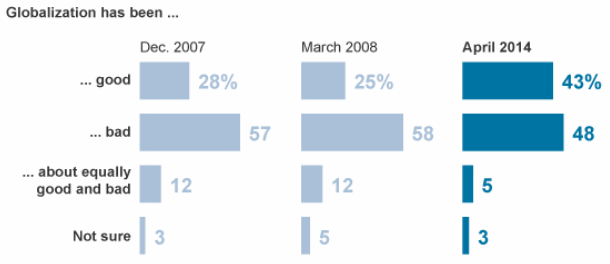The United States has the reverse Midas touch: everything it touches turns into, well, garbage alike its near-zero growth jokeonomy. After the fine job the crusaders did of remolding Afghanistan and Iraq in their own image--not full of promised freedom 'n' growth but lots of discord and infighting coupled with little economic growth--the average American has grown tired of wasting lives and treasure on foreign adventurism with nothing to show for. It's just as well since it has a host of worsening domestic problems. For starters, try bastardy, insolvency, obesity, stupidity...identify some undesirable attribute and odds are it's rising in America.
So it's gratifying that a recent WSJ/NBC poll has nearly half of them saying the US should be less interventionist in world affairs--47% to be precise. Going abroad from a position of weakness has not done the US much good in terms of gaining other people's respect. After all, who aspires to emulate a downwardly mobile country? First sort out matters at home, then perhaps people will listen to you instead of having "close" allies turn you down flat. How does the song go? Nobody knows you when you're down and out. Instead of sticking their noses in everyone else's business NSA style, American citizens would prefer leaving the rest of us be:
But here's the curious thing: Americans are becoming less hostile to free trade globalization from recent phobic extremes, even if on the balance they still dislike it. Putting 2 and 2 together, my take is that Americans recognize they are no longer willing or able to take the lead in world affairs. OTOH, they do recognize the benefits of being open to trade. Fair enough: let others take the lead, especially developing countries, so these countries can take care of poor old, beaten down Uncle Sam in his sunset years.
The rest of us do not particularly like the American brand of inequality and unfairness writ large on the world stage via subprime globalization. Given the United States' demonstrated inability to do anything about this sorry situation--if the US cannot "save" itself, what more the world--the burden falls on us to fix the mess America played a starring role getting us into. If this is indeed the case, the fault for doing nothing will shift to us instead of doddering old Uncle Sam.
So it's gratifying that a recent WSJ/NBC poll has nearly half of them saying the US should be less interventionist in world affairs--47% to be precise. Going abroad from a position of weakness has not done the US much good in terms of gaining other people's respect. After all, who aspires to emulate a downwardly mobile country? First sort out matters at home, then perhaps people will listen to you instead of having "close" allies turn you down flat. How does the song go? Nobody knows you when you're down and out. Instead of sticking their noses in everyone else's business NSA style, American citizens would prefer leaving the rest of us be:
But here's the curious thing: Americans are becoming less hostile to free trade globalization from recent phobic extremes, even if on the balance they still dislike it. Putting 2 and 2 together, my take is that Americans recognize they are no longer willing or able to take the lead in world affairs. OTOH, they do recognize the benefits of being open to trade. Fair enough: let others take the lead, especially developing countries, so these countries can take care of poor old, beaten down Uncle Sam in his sunset years.
The rest of us do not particularly like the American brand of inequality and unfairness writ large on the world stage via subprime globalization. Given the United States' demonstrated inability to do anything about this sorry situation--if the US cannot "save" itself, what more the world--the burden falls on us to fix the mess America played a starring role getting us into. If this is indeed the case, the fault for doing nothing will shift to us instead of doddering old Uncle Sam.



